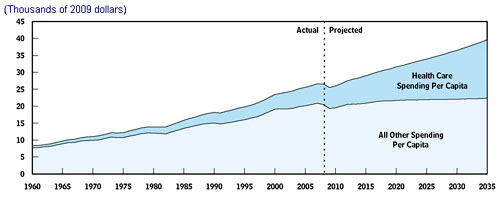Over at TNR, William Galston continues his recent conversation about just how much fiscal stimulus the United States can afford, and concludes that it’s hard to say. We certainly shouldn’t terminate basic safety net protections during a brutal recession, he says, but beyond that there’s some limit to how much we can run up the federal debt and we just don’t know for sure what that limit is. Fair enough. Then this:
What matters most is making a credible commitment — through binding legislation that changes both programs and budget procedures — to alter our long-term fiscal course before our debt enters the red zone (where federal debt closes in on GDP). I can only hope that the report of the president’s fiscal commission, due out in December, sets the stage for the national discussion we have evaded for far too long. This discussion will test our capacity to govern ourselves wisely, and the whole world will be watching.
Well, I recommend that the world avert its eyes now, because our capacity to govern ourselves wisely is in pretty short supply right now. The basic problem, as about a million pundits have pointed out before, is that most of the things we talk  about will have only a small long-term effect on federal spending. We could raise taxes a bit, cut a few programs here and there, resolve to fight fewer wars, and fix Social Security, and that would all be great. It would have a genuinely positive effect. But it’s a drop in the ocean compared to healthcare costs. If we don’t rein those in, they’ll swamp everything else.
about will have only a small long-term effect on federal spending. We could raise taxes a bit, cut a few programs here and there, resolve to fight fewer wars, and fix Social Security, and that would all be great. It would have a genuinely positive effect. But it’s a drop in the ocean compared to healthcare costs. If we don’t rein those in, they’ll swamp everything else.
But what are the odds of that? The recent healthcare reform bill made a start on holding down spending, but it was a pretty small start and generated massive opposition anyway. In the near term, then, there’s simply no chance of making a credible commitment to seriously reduce the growth rate of healthcare costs. But this is the subject that separates the posers from the real players. Forget Social Security, which is a smallish problem and an easily solved one. That’s mostly good for demagogues. Healthcare spending is the 800 pound gorilla. Solve that, and you’ve solved our long-term spending problem. Ignore it, and you don’t.

















